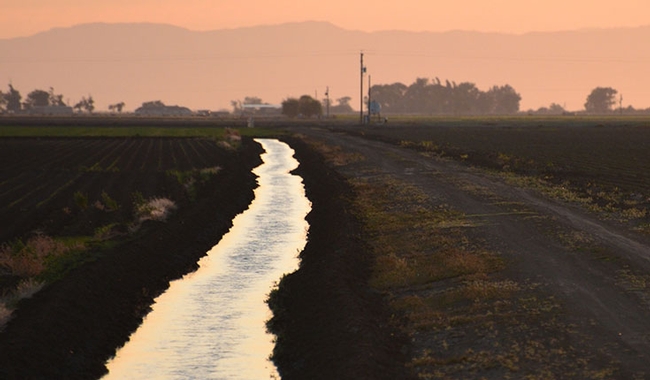Posts Tagged: water policy
UC ANR statements on Richard Rosenberg’s death
Richard Rosenberg, former chairman and CEO of the Bank of America, died Friday, March 3. He was 92. When Rosenberg retired from BofA in 1996, the bank honored him by endowing the Rosenberg International Forum on Water Policy at UC Agriculture and Natural Resources.
Glenda Humiston, University of California vice president for agriculture and natural resources:
“Dick Rosenberg is well-known for his generous gifts to the University of California and to the Bay Area. With his Bank of America endowment gift to UC Agriculture and Natural Resources to create the Rosenberg International Forum on Water Policy, he has had the most far-reaching and profound impact. Over the years, Dick developed an understanding of the complex and contentious water issues in California and across the globe. His intent in bringing together scientists and policymakers from around the world to discuss water management was to reduce conflicts surrounding this critical resource. While we continue to face challenges of water scarcity and water quality, we are able to solve some issues by sharing our knowledge and experiences. For years to come, the global community will benefit from Dick Rosenberg's foresight to fund the International Forum on Water Policy.”
Soroosh Sorooshian, UC Irvine Distinguished Professor and director of the Center for Hydrometeorology and Remote Sensing and chair of the UC ANR Rosenberg International Forum on Water Policy:
“Mr. Richard Rosenberg was passionate about the well-being of the environment in addition to his responsibilities managing one of the largest financial institutions in the world. His concern about water resources scarcity and international water conflicts led to the establishment of the UC ANR Rosenberg International Forum for Water Policy with an endowment gift from the Bank of America to honor Dick's vision. It is a great honor for the forum to carry the vision of Mr. Rosenberg as a lasting legacy to his commitment to issues related to international water policy.”
Henry Vaux, Jr., UC Riverside Professor Emeritus, UC ANR Associate Vice President Emeritus, and Founding Chair of Rosenberg International Forum on Water Policy
Richard Rosenberg made many contributions to the well-being of all Californians. Among those was the rallying of the business community to the cause of managing an earlier severe drought that began in the late 1980s. This expression of his long term-interests in the management of water resources led the Board of the Bank of American to establish the Rosenberg International Forum on Water Policy at the University of California in his honor. Over the years, that Forum has met at 10 locations around the world, often with Rosenberg himself in attendance. The work of the Forum has influenced water policy in countries ranging from Australia to Jordan. As a founding chair of the Forum, I can attest to the crucial role that he played in guiding the establishment of the institution and ensuring its success over two and a half decades. I will miss his wise counsel, sharp insights on almost everything and his great sense of humor. I send my condolences and best wishes to his wife, Barbara, and his family.
About the Rosenberg International Forum on Water Policy
The Rosenberg International Forum on Water Policy originated in 1996 with an endowment gift from the Bank of America to the University of California. The purpose of the gift was to support a water policy forum in honor of then-retiring Bank Chair and Chief Executive Officer Richard Rosenberg. Rosenberg had a long-term interest in water resources and was credited with rallying the California business community to address the causes and impacts of the drought of 1987-1992.
The Rosenberg Forum is held every other year in different locations around the world. Participation is limited to 50 water scholars and senior water managers. Interactive discussions about the science of water management and different experiences in water management around the globe are at the heart of the forum.
The first forum was held in San Francisco in 1997, followed by gatherings in Barcelona, Spain; Canberra, Australia; Ankara, Turkey; Banff, Canada; Zaragoza, Spain; Buenos Aires, Argentina; Aqaba, Jordan; and Panama City, Panama. The last forum was held in San Jose, California, in 2018 and has been on hiatus due to the pandemic.
The overarching theme of the Rosenberg Forum is "reducing conflict in the management of water resources." Specific sub-themes are chosen by an advisory committee for each individual forum. The primary objective is to facilitate the exchange of information and experience in the management of water resources.
The problems of managing water are surprisingly common around the world. However, approaches and solutions may differ depending on the available financial resources as well as social and cultural norms. Discussions of alternative approaches and identification of what works and what doesn't are intended to aid in devising more effective and efficient water-management schemes.
UC Irvine’s Sorooshian to lead Rosenberg International Forum on Water Policy
The University of California Division of Agriculture and Natural Resources (UC ANR) has appointed Soroosh Sorooshian as chair of the Rosenberg International Forum on Water Policy. Sorooshian is distinguished professor of civil and environmental engineering and earth sciences at UC Irvine.
The forum, a program of UC ANR's California Institute for Water Resources, was launched in 1996 with an endowment gift from the Bank of America honoring then-retiring bank chairman and CEO Richard Rosenberg. Experts from all over the world convene at the Rosenberg Forum to identify ways in which conflict in the management of water resources can be reduced and to promote science-based policies to govern the management of water resources.
“I'm delighted that the University of California, through the Rosenberg International Forum on Water Policy, is carrying out the vision of Richard Rosenberg in reducing conflict in water resources management through dialogue and information sharing between scientists and policymakers,” said UC President Janet Napolitano. “We are pleased that Dr. Soroosh Sorooshian, with his wide range of expertise and prominence in the international community, will be leading this important work as the incoming chair of the Rosenberg Forum.”
The forum meets biennially at different locations around the world. Previous forums have been held in San Francisco (1997), Spain (1999 and 2008), Australia (2002), Turkey (2004), Canada (2006), Argentina (2010), and Jordan (2013). The most recent forum was in January 2016 in Panama City, Panama.
“Over the past 30 years, the Rosenburg Forum has raised UC's stature in international water conflict resolutions,” said Glenda Humiston, UC vice president for Agriculture and Natural Resources. “The forum will continue to develop new approaches and solutions to addressing water problems around the world under the leadership of Dr. Sorooshian, an accomplished and brilliant scientist.”
Attendance at the forum is by invitation and limited to 50 water scholars and senior water managers. Participants devote their time at each forum to discussions of previously commissioned papers, which are published following the meeting. The conclusions and findings of each forum are also published.
“The need for approaches and solutions to securing clean, reliable water sources crosses all political, ethnic and territorial boundaries,” said UC Irvine Chancellor Howard Gillman. “But how we get to those solutions varies greatly, depending on culture, financial resources and social norms. I'm confident that Soroosh Sorooshian will be able to find ways to transcend the differences and find workable solutions for all. I'm proud that UCI can contribute to making great progress on such global issues.”
Sorooshian is also director of the Center for Hydrometeorology and Remote Sensing in the Henry Samueli School of Engineering at UC Irvine. His fields of interest include hydrometeorology, water resources systems, climate studies and application of remote sensing to water resources issues in arid and semi-arid zones. Sorooshian is a member of the National Academy of Engineering and has garnered many international and national awards for his work. His appointment was effective April 1, 2016.
“I am honored to be appointed chair of the Rosenberg Forum and serve after my dear colleague Henry Vaux Jr., professor emeritus of resource economics at the University of California Riverside, who has filled this role since the forum was established,” Sorooshian said. “I've also had the pleasure of meeting Mr. Rosenberg. He is a remarkable and humble man whose wisdom and knowledge of international issues are unmatched. I thank him for sharing his vision of the role the Rosenberg Forum can play in addressing international water issues, and I look forward to this new opportunity.”
International and California water conferences shine new light on lingering drought
The gauge reads 105 degrees in California's state capital as this article is being drafted. The four-year drought has baked itself into the landscape, with dead lawns crunching under feet and trees wilting under the heat, and has so far stolen a year's worth of precipitation. Deprived of moisture, the state has lost to wildfires three times the acreage of an average year. The once green valleys are now murky fishbowls of haze.
The total cost to the state, according to a new report released Tuesday by the Center for Watershed Sciences (CWS) at the University of California, Davis, is now $2.74 billion and 21,000 jobs.
Some see this as the new normal and new evidence ties it to climate change.
But despite the profound impact on the California agricultural economy, the state is actually doing well. And it's becoming the world's test kitchen for best practices in adapting agriculture to changing water supplies.
A legacy of progressive environmental regulations
“Despite the drought, we have a remarkably robust agricultural system,” says Jay Lund, director of CWS. “If you go back millennia and look at droughts, with a 30 percent loss of water you'd have a 30 percent loss of food production and you'd have 30 percent of the people starving.”
That hasn't happened today, he says, because California agriculture is more diversified than ever and its economy is connected to a world food market that advances despite the drought.
The many tools that UC Agriculture and Natural Resources (UC ANR) and others are deploying to help Californians better adapt today are also being translated into immediate lessons for the developing world.
Stockholm comes to Davis
Starting Sunday, representatives from more than 200 organizations will meet in Stockholm, Sweden, for the World Water Week mega conference. Under the theme Water for Development, they will refine the United Nations' broad Sustainable Development Goals to address the one billion people who would still be without safe drinking water and basic sanitation.
Many partners of UC ANR and the UC Davis World Food Center will be leading some of the numerous discussions, including: CGIAR, the World Bank, the Bill & Melinda Gates Foundation and the UN Food and Agriculture Organization.
A separate conference at UC Davis in October will then bring the focus to California and water for food. This global event, called Water Policy for Food Security, will draw on lessons from World Water Week through shared speakers like Chris Brown, the general manager of responsibility and sustainability at Olam International, and Claudia Ringler, a senior researcher at the International Food Policy Research Institute, which is co-hosting the event.
Presentations on the Case of California will open two days of panel discussions, ranging from how climate change will impact the cost of water in different regions of the world to how groundwater aquifers can be recharged and how new policies can bolster water markets.
The goal is to seize the momentum now building for an international effort towards #WaterSecurity. By drawing development investors, leading scientists, committed policy makers and global industry partners into one room within the world's number one ag school, the event will set a course of action in sustainably securing water for food and for people across the planet.








